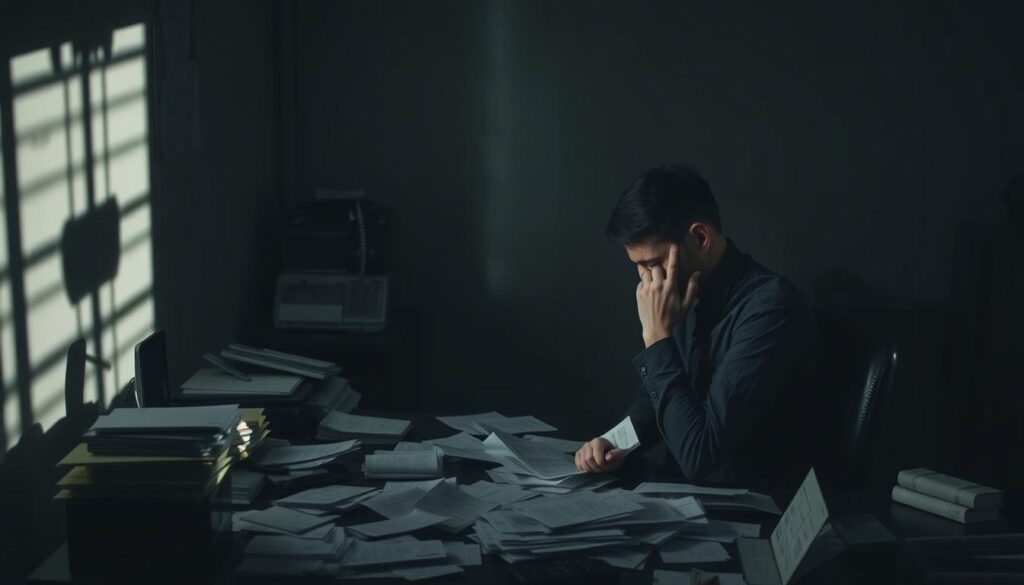A healthy credit profile is vital for financial well-being. Yet, credit-related disputes can be frustrating and complex. Legal help is available for those facing credit report errors and other issues.
Lawyers can assist with Fair Credit Reporting Act violations and debt collection harassment. This article explores how lawyers help resolve credit disputes. You’ll learn how to protect your financial rights and navigate the legal landscape.
Key Takeaways
- Understand the importance of maintaining a good credit score and how lawyers can help resolve credit report errors and inaccuracies
- Learn about common FCRA violations and the penalties credit bureaus face for non-compliance
- Discover the legal options available for addressing debt collection harassment and unfair lending practices
- Explore the benefits of working with a credit repair attorney and the factors to consider when choosing one
- Gain insights into effective strategies for disputing credit report issues and rebuilding your credit after a successful resolution
Understanding Credit Disputes and Your Legal Rights
A good credit score is vital for many aspects of life. It affects loan terms, apartment rentals, and job opportunities. Credit report errors can harm your score, causing various problems.
Knowing your legal rights is crucial when dealing with credit report issues. You can take action to protect your financial future.
Importance of Maintaining a Good Credit Score
Your credit score reflects your creditworthiness. It impacts your financial well-being. A high score opens doors to better interest rates and lower insurance premiums.
It can even boost your employment prospects. A low score leads to higher borrowing costs and difficulty securing housing or jobs.
Common Credit Report Errors and Inaccuracies
Credit reports may contain errors or inaccuracies. These can significantly impact your credit score.
- Incorrect personal information
- Accounts that do not belong to you
- Incorrect account balances or payment histories
- Duplicate accounts or listings
- Outdated or erroneous public records
Regular monitoring of your credit report is essential. It helps you spot and address any issues quickly.
Take proactive steps to dispute credit report errors. This protects your credit score and ensures a healthy financial future.
Lawyers Credit Disputes: Navigating the Legal Landscape
Lawyers specializing in credit disputes offer invaluable expertise. They possess the legal knowledge to resolve complex credit-related issues effectively. These experts can help with credit report errors, FCRA violations, and debt collection harassment.
Role of Lawyers in Credit Dispute Resolution
Lawyers are crucial advocates in credit dispute resolution. They identify dispute causes, gather documentation, and communicate with relevant parties. Their legal expertise ensures all laws and regulations are followed, protecting consumer rights.
Types of Credit Disputes Handled by Lawyers
- Errors on credit reports, such as inaccurate account information or fraudulent accounts
- Violations of the Fair Credit Reporting Act (FCRA), including failure to investigate disputes or to correctly update or remove inaccurate information
- Abusive debt collection practices, including harassment, false threats, or attempts to collect on invalid or expired debts
- Disputes related to identity theft and unauthorized accounts
- Unfair or discriminatory lending practices
Lawyers help consumers navigate the complex world of credit disputes. They work to resolve errors and address FCRA violations. Their guidance is crucial in fighting unfair lending practices.
A skilled lawyer can make a significant difference in protecting your financial well-being. They strive to achieve the best possible outcomes for their clients.
FCRA Violations and Consumer Rights
The Fair Credit Reporting Act (FCRA) protects consumer rights in credit reporting. It lets people check their credit reports and dispute errors. The FCRA holds credit bureaus responsible for violations.
Knowing FCRA rules and penalties is key for protecting your finances. It helps consumers take action against unfair practices.
Fair Credit Reporting Act (FCRA) Explained
The FCRA sets rules for credit bureaus and creditors. It gives consumers the right to see their credit reports and challenge mistakes.
Under the FCRA, you must be told about negative actions based on your report. Credit bureaus must ensure accurate consumer credit info.
Penalties for FCRA Violations by Credit Bureaus
- Failure to investigate consumer disputes: Credit bureaus can face penalties of up to $3,500 per violation for failing to investigate consumer disputes in a timely and thorough manner.
- Furnishing inaccurate information: Credit bureaus can be held liable for damages and attorney’s fees if they knowingly or negligently report inaccurate information on a consumer’s credit report.
- Willful non-compliance: Egregious FCRA violations, such as willfully disregarding the law’s requirements, can result in punitive damages of up to $1,000 per violation, in addition to actual damages and attorney’s fees.
Knowing your FCRA rights helps you protect your credit profile. You can take action if credit bureaus fail their duties.
Understanding penalties for violations empowers you to address credit issues effectively. This knowledge is crucial for maintaining good financial health.
“The FCRA is a powerful tool that gives consumers the ability to hold credit bureaus accountable for the accuracy and integrity of their credit reports. Knowing your rights and the potential penalties for FCRA violations can be crucial in resolving credit disputes.”
Debt Collection Harassment: Know Your Rights
We all deserve fair treatment, even when dealing with debt collectors. Some agencies use harassment and unfair practices. But you have legal rights to protect you from such behavior.
The Fair Debt Collection Practices Act (FDCPA) sets rules for debt collectors. This law bans many harassment tactics. It protects consumers from unfair treatment by debt collection agencies.
Under the FDCPA, debt collectors can’t do certain things. They can’t call at odd hours or use abusive language. They also can’t contact you at work without permission.
- Calling at unreasonable hours, such as before 8 a.m. or after 9 p.m.
- Using abusive or threatening language
- Contacting you at work if they know your employer prohibits such calls
- Failing to identify themselves as debt collectors when they first contact you
- Attempting to collect more than the amount you actually owe
If you’ve faced these unlawful practices, take action. You can file a complaint with the Consumer Financial Protection Bureau (CFPB). Or, seek help from a consumer rights attorney.
These lawyers specialize in debt collection harassment and consumer rights cases. They can guide you through the legal process and protect your rights.
“Debt collectors have no right to harass or intimidate you. Know your rights and stand up for yourself.”
Understanding your rights helps you end harassment. You can regain control of your financial situation. The law supports you in these challenges.
With the right help, you can achieve a better outcome. Don’t let debt collectors bully you. Stand up for your rights and seek support when needed.

| Unlawful Debt Collection Practices | Your Legal Rights |
|---|---|
| Calling at unreasonable hours | Debt collectors can only call between 8 a.m. and 9 p.m. in your local time zone. |
| Using abusive or threatening language | Debt collectors cannot use profanity, threats, or other tactics to harass you. |
| Contacting your employer | Debt collectors cannot contact your employer unless they have your permission or it is necessary to locate you. |
| Failing to identify themselves | Debt collectors must identify themselves as such and provide information about the debt they are trying to collect. |
| Attempting to collect more than the amount owed | Debt collectors cannot add unauthorized fees or interest to the original debt amount. |
Hiring a Credit Repair Lawyer
A credit repair lawyer can be a valuable asset for complex credit disputes. These experts know how to protect your rights and fix credit report errors. Their skills can help you navigate the credit repair process effectively.
Benefits of Working with a Credit Repair Attorney
A credit repair attorney offers several key advantages:
- In-depth understanding of credit laws and regulations, such as the Fair Credit Reporting Act (FCRA), to identify and address violations
- Ability to communicate directly with credit bureaus and creditors on your behalf, leveraging their legal expertise
- Formulation of personalized strategies to dispute inaccuracies and remove negative items from your credit report
- Representation in legal proceedings, if necessary, to protect your consumer rights and seek appropriate remedies
Considerations When Choosing a Credit Repair Lawyer
When choosing a credit repair lawyer, keep these factors in mind:
- Expertise and experience in credit dispute resolution
- Proven track record of successful credit report improvements
- Transparent pricing and fee structure, with no hidden charges
- Commitment to ethical and transparent practices
- Accessible communication and responsiveness to client inquiries
Picking the right credit repair lawyer can make a big difference. Look for someone with experience and a good track record. This will help you improve your credit profile with confidence.
Credit Counseling Services and Alternatives
Credit card debt can be overwhelming. Many people seek credit counseling services for help. These services offer support to manage credit and regain financial stability.
Exploring Credit Counseling Options
Credit counseling services come in various forms. Each has its own benefits and drawbacks. Let’s look at some options:
- Non-profit credit counseling organizations: These often provide free or low-cost counseling. They offer debt management plans and educational resources to help improve finances.
- For-profit credit counseling companies: These companies charge fees for their services. It’s important to research their reputation before using them.
- Online credit counseling platforms: These services offer remote support for credit counseling and debt management.
When choosing a credit counseling service, consider the cost and accreditation. Look at the range of services offered to find the best fit for you.
| Credit Counseling Service Type | Typical Cost | Key Advantages | Potential Drawbacks |
|---|---|---|---|
| Non-profit credit counseling | Free or low-cost |
|
|
| For-profit credit counseling | Typically fee-based |
|
|
| Online credit counseling | Varies |
|
|
Research and compare credit counseling providers carefully. This ensures you get quality, trustworthy services that match your financial goals. Look for cost-effective options that align with your needs.

There are other ways to manage credit besides counseling services. You might consider debt consolidation loans or balance transfer credit cards. DIY budgeting and debt repayment plans are also options.
These alternatives can offer more flexibility. They provide additional choices for improving your credit and financial health.
Lawyers Credit Disputes: Improving Your Credit Score
Lawyers’ expertise can be crucial in boosting your credit score. They can address credit report errors and Fair Credit Reporting Act violations. These professionals can significantly impact your creditworthiness.
Credit dispute lawyers understand consumer rights under various laws. They can challenge inaccuracies and dispute fraudulent accounts effectively. Their goal is to ensure your credit report accurately reflects your financial history.
Through legal strategies, lawyers credit disputes can help you improve your credit score by:
- Identifying and disputing erroneous information on your credit report
- Addressing FCRA violations by credit bureaus and creditors
- Removing fraudulent or unauthorized accounts from your credit history
- Negotiating with creditors to remove or modify negative items
- Advocating for your rights and ensuring compliance with consumer protection laws
An experienced lawyer can help you take steps to boost your credit score. This can lead to better interest rates and loan approvals. It may even improve your employment opportunities.
“Resolving credit report errors and disputes can have a significant impact on your credit score and overall financial well-being. Hiring a qualified lawyer can be a game-changer in this process.”
Don’t let credit report issues hold back your financial progress. Consider working with a lawyers credit disputes specialist. Take the first step towards credit score improvement today.
Fair Lending Practices and Discrimination Laws
Fair lending practices are vital for financial inclusion and equality. Laws like the Equal Credit Opportunity Act (ECOA) and Fair Housing Act (FHA) protect consumers. These laws ban lending discrimination based on race, religion, gender, and other factors.
Lenders must make decisions on creditworthiness alone. They can’t use discriminatory factors in their choices. If a loan is denied, lenders must explain why.
Understanding Fair Lending Laws
The ECOA and FHA set clear rules for lenders to follow. These laws promote transparency and hold lenders accountable. Lenders must provide reasons for adverse actions like loan denials.
Identifying Discriminatory Lending Practices
- Denying credit or offering less favorable terms based on protected characteristics, such as race, gender, or age.
- Steering borrowers towards certain loan products or neighborhoods based on their demographic profiles.
- Imposing different application or qualification requirements for individuals from protected groups.
- Failing to provide equal access to information or assistance throughout the lending process.
Consumers can file complaints if they face lending discrimination. They can report to regulatory agencies or take legal action. Knowing fair lending laws helps ensure a more equal financial system.
Staying informed about these practices helps maintain fairness in lending. It’s crucial to monitor lending activities and speak up against unfair treatment.

| Law | Key Provisions | Prohibited Discrimination |
|---|---|---|
| Equal Credit Opportunity Act (ECOA) | Requires lenders to make credit decisions based on creditworthiness, not on protected characteristics | Race, color, religion, national origin, sex, marital status, age |
| Fair Housing Act (FHA) | Prohibits discrimination in housing-related activities, including mortgage lending | Race, color, religion, national origin, sex, familial status, disability |
Consumer Rights Litigation in Credit Disputes
Consumer rights litigation empowers individuals to challenge unfair credit practices. It targets credit bureaus, creditors, and debt collectors who violate consumer protection laws. This legal tool helps resolve various credit-related issues effectively.
Legal action can address inaccurate credit reporting, unlawful debt collection practices, or discrimination in lending decisions. Consumers can seek justice and potentially recover financial damages through litigation.
The Process of Consumer Rights Litigation
Consumer rights litigation involves several key steps. These steps guide consumers through the legal process.
- Identifying the specific violation of consumer protection laws, such as the Fair Credit Reporting Act (FCRA) or the Fair Debt Collection Practices Act (FDCPA).
- Gathering evidence and documentation to support the consumer’s claims.
- Filing a lawsuit against the responsible party, which may be a credit bureau, creditor, or debt collector.
- Engaging in the legal proceedings, which may include negotiations, mediation, or a trial.
- Potentially recovering damages, such as actual damages, statutory damages, and attorney’s fees, if the consumer prevails.
The legal process can be complex and challenging. An experienced consumer rights litigation attorney can provide valuable guidance.
They help consumers navigate the legal system effectively. With proper support, consumers can seek the justice they deserve.
“Consumers have powerful legal tools to hold credit bureaus and creditors accountable for violations of their rights. Consumer rights litigation can be a game-changer in resolving credit disputes.”
Knowing your rights is crucial in addressing credit-related issues. Consumer rights litigation offers a path to resolve disputes.
It helps consumers take proactive steps towards better financial health. Understanding these options empowers individuals to protect their credit rights.
Strategies for Effective Credit Disputes
Credit disputes can be tricky, but you can resolve issues with the right approach. Success hinges on gathering evidence and working with credit bureaus and creditors. These steps are crucial for effective credit disputes.
Gathering Evidence and Documentation
Thorough preparation is key for a successful credit dispute. Start by collecting all relevant documents.
- Copies of your credit reports from each of the three major credit bureaus: Experian, Equifax, and TransUnion.
- Any written correspondence or records of communication with creditors or credit bureaus regarding the disputed items.
- Proof of identity, such as a driver’s license or passport, to verify your identity during the dispute process.
- Detailed records of any fraudulent or inaccurate information on your credit reports.
Organize your credit dispute evidence clearly. This will make your case stronger and show you’re serious about fixing the issue.
Working with Credit Bureaus and Creditors
After gathering documents, it’s time to talk to credit bureaus and creditors. Credit dispute strategies may include:
- Submitting a formal dispute letter to the credit bureaus, outlining the inaccuracies and providing supporting evidence.
- Communicating directly with creditors to address any erroneous or fraudulent information in your credit file.
- Monitoring the progress of your dispute and following up with the credit bureaus and creditors to ensure timely resolution.
- Leveraging your rights under the Fair Credit Reporting Act (FCRA) to ensure prompt investigation and correction of any verified errors.
Be professional and persistent when working with credit bureaus and creditors. This approach can boost your chances of a good outcome.

“Effective credit dispute strategies require patience, persistence, and a commitment to gathering and presenting comprehensive evidence.”
Resolving Credit Report Errors and Inaccuracies
A clean, accurate credit report is vital for financial health. Credit report errors are common and can harm consumers. Let’s explore how to fix these issues and protect your credit.
Disputing Errors with Credit Bureaus
Found errors on your credit report? Dispute them with the credit bureaus. Submit a written dispute with supporting documents to the relevant bureau(s).
They must investigate and fix verified errors. Gather evidence like receipts, billing statements, and creditor correspondence. Follow bureau procedures and deadlines for best results.
Legal Recourse for Unresolved Credit Report Issues
If disputes remain unresolved, legal options exist. The Fair Credit Reporting Act (FCRA) protects consumer rights regarding credit reports. You may sue if a bureau fails to investigate or correct errors.
A credit repair lawyer can help navigate the legal process. They gather evidence, communicate with bureaus, and pursue legal action if needed.
| Common Credit Report Errors | Legal Recourse for Unresolved Issues |
|---|---|
|
|
Know your rights to resolve credit report errors. Take action to protect your credit and financial health. Stay persistent and detail-oriented throughout the dispute process.
Credit Bureaus Disputes: Best Practices
Credit bureau disputes can be tricky. But knowing the best ways to handle them can help. A smart approach can make a big difference in solving credit issues.
Keep good records of all credit problems. Collect statements, receipts, and letters from creditors. Having proof makes your case stronger when disputing errors with credit bureaus.
Always send disputes in writing. Use mail or the credit bureau’s online system. Avoid phone disputes as they’re harder to track.
- Submit disputes in writing, either by mail or through the credit bureau’s online dispute portal. Avoid making disputes over the phone, as they may not be as well-documented.
- Be specific and detailed in the dispute, clearly outlining the inaccuracies or errors that need to be corrected.
- Provide any supporting documentation that can substantiate the dispute, such as proof of payments or evidence of identity theft.
Stay calm and keep trying during the dispute process. Credit bureaus must look into disputes within 30 days. Sometimes it takes longer.
Check on your dispute’s progress often. Be ready to take further action if needed.
| Best Practice | Description |
|---|---|
| Document Everything | Gather all relevant statements, receipts, and correspondence to support the dispute. |
| Submit Disputes in Writing | Use mail or the credit bureau’s online dispute portal to ensure the dispute is well-documented. |
| Be Specific and Detailed | Clearly outline the inaccuracies or errors that need to be corrected. |
| Provide Supporting Documentation | Include any evidence that can substantiate the dispute, such as proof of payments or identity theft documentation. |
| Be Persistent | Follow up on the status of the dispute and be prepared to escalate the issue if necessary. |
Using these tips can help you handle credit bureau disputes better. You’ll have a better chance of fixing credit problems successfully.
Rebuilding Credit After a Dispute Resolution
Resolving credit disputes is a big step towards better finances. But it’s just the beginning. After fixing errors on your credit report, focus on rebuilding your score.
Develop good credit habits for long-term success. This will help maintain your improved financial standing.
Improving Credit Score After a Successful Dispute
A successful credit dispute often leads to a quick score boost. To keep it rising, monitor your credit report regularly. Address any remaining issues promptly.
Make on-time payments consistently. Keep credit card balances low. Diversify your credit mix for a steadily improving score.
Maintaining Good Credit Habits
Rebuilding credit is an ongoing process. Good habits prevent future disputes and maintain a healthy credit profile. Review your credit report often.
Dispute new errors quickly. Practice responsible money management. Pay bills on time and keep credit card balances low.

